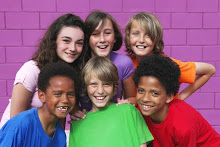Six Great Things About Family Rituals

As I have studied the parent coaching process and been observed by my cohort, one specific area of interest has emerged for me---I love helping people figure out meaningful rituals.
While a ritual is often associated with religion, it is defined from Bing Dictionary as follows:
ritual
1. established formal behavior: an established and prescribed pattern of observance, e.g. in a religion
2. performance of formal acts: the observance of actions or procedures in a set, ordered, and ceremonial way
3. system of rites: the system of set procedures and actions of a group
The way that I see it, a ritual is a way to take something positive in your life and formalize it in a way that makes it even more meaningful. For instance, one mom was telling me that she loves feeding the horses with her daughter and for her it is a really special time. So I suggested that it become a weekly ritual.
1. Rituals create consciousness! When something becomes a ritual, it makes us conscious that we are doing something really special and meaningful to us. For example, if your family ritual was to have a snow ball fight on the evening of the first snow. You are may be consciously celebrating the seasons, your family, the passage of time, the idea that we can change the usual schedule to celebrate something new and different. It causes us to stop, to notice the snow, the feel, the texture.
2. Even if your kids roll their eyes, rituals are often remembered and cherished. My dad had this ritual to take pictures of the entire bus stop on the first day of school. I remember being annoyed by this and a little embarrassed too. But now I love looking at the pictures of us every year smiling at the bus stop with the neighborhood kids. It's great to imagine my dad taking a morning away from the office to snap these yearly pictures and I see that they are filled with love.
3. Rituals are something kids LOVE. For instance, I started our weekly ritual of family night and now Mira is more into it than we are. She won't let us forget. On Christmas morning, I play jingle bells on the piano before anyone can open gifts. They may not love my playing, but everyone loves this silly ritual and it creates an anticipation for the gift-giving. Instead of just moving into the gifts, they have to wait for the one Jewish member of the family to bang out my song on the piano.
4. Rituals create a warm family feeling. I am always on the lookout for family rituals that are interesting and that draw families together. One friend has a weekly pizza night. Another friend's kids have sleepovers in each kid's room on a weekly basis. The ideas are endless!
5. Rituals define your uniqueness. I think a lot of people like creating rituals because they can really define who you are as a family. For instance, my husband and I realized that going to a music festival each summer is a family ritual for us. The festival is really fun, but it's more than that. It's our family festival. It's something that neither of our parents did with us when we were kids, but our love of music is something we consciously want to be a part of our daughters life. In some ways, we get excited for the festival because it's tons of fun. But, in other ways, the excitement comes from the ritual--packing up the car, waiting in line to get our tickets, finding our camping spot and on and on.
6. Rituals can pass along family heritage. While rituals can define your uniqueness as a family, they also can play the great role of passing along the history from one generation to the next. In my life, this mainly applies to my Jewish culture. When we celebrate a holiday like Passover, we do many of the same rituals that my dad did and that his parents did. I love imagining my grandparents parents singing the same songs as we do. It makes me feel close to my history and a part of something bigger than myself.
The book Rituals for Our Times: Celebrating, Healing, and Changing our Lives and Our Relationships is a beloved book that helped shape my ideas on the importance of rituals.
Labels: family gatherings., family rituals, rites of passage, rituals


